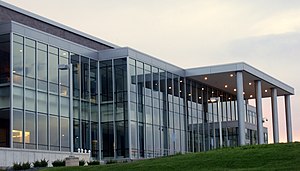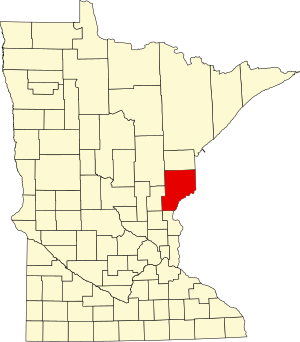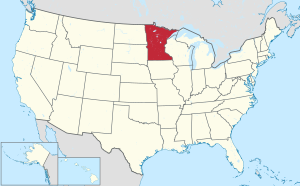Pine County is a county in the U.S. state of Minnesota. As of the 2020 census, the population was 28,876.[2] Its county seat is Pine City.[3] The county was formed in 1856 and organized in 1872. Today, Pine County is the fastest growing county in the state.[4][5] Part of the Mille Lacs Indian Reservation is in Pine County.
Pine County | |
|---|---|
 Pine County Courthouse, Pine City | |
 Location within the U.S. state of Minnesota | |
 Minnesota's location within the U.S. | |
| Coordinates: 46°08′N 92°44′W / 46.14°N 92.74°W | |
| Country | |
| State | |
| Founded | March 1, 1856 (created) 1872 (organized)[1] |
| Named for | The abundant pine trees in the area |
| Seat | Pine City |
| Largest city | Pine City |
| Area | |
• Total | 1,435 sq mi (3,720 km2) |
| • Land | 1,411 sq mi (3,650 km2) |
| • Water | 23 sq mi (60 km2) 1.6% |
| Population (2020) | |
• Total | 28,876 |
• Estimate (2023) | 30,197 |
| • Density | 20/sq mi (7.8/km2) |
| Time zone | UTC−6 (Central) |
| • Summer (DST) | UTC−5 (CDT) |
| Congressional district | 8th |
| Website | www |
History
editPine County was organized on March 1, 1856, with territory partitioned from Chisago and Ramsey counties. The original county seat was Chengwatana. It was named for its abundant pine tree growth.[6]
In 1857, Buchanan County in full and the southern parts of Aitkin and Carlton Counties were formed from the original Pine County, with Kanabec County organized a year later. In 1861, Buchanan County was dissolved and folded into Pine County. Pine County was reorganized in 1872, with Pine City named as the county seat for the remaining smaller area.[7]
Popular culture
editPine County has been featured in a series of mysteries by Dean Hovey.[8][9]
Geography
editPine County lies on the east side of Minnesota. Its southeast border abuts Wisconsin (across the St. Croix River). The St. Croix flows southerly along its border. The Kettle River flows southeastward through central Pine County, discharging into the St. Croix on the county's east border, and the Snake River flows eastward through the lower part of the county toward its discharge point into the St. Croix. The county terrain consists of low rolling hills, carved with drainages, partly wooded and otherwise devoted to agriculture.[10] The terrain slopes to the south and east, with its highest point near its northeast corner, at 1,319 ft (402 m) ASL.[11] The county has an area of 1,435 square miles (3,720 km2), of which 1,411 square miles (3,650 km2) is land and 23 square miles (60 km2) (1.6%) is water.[12]
Major highways
editAdjacent counties
edit- Carlton County - north
- Douglas County, Wisconsin - northeast
- Burnett County, Wisconsin - east
- Chisago County - south
- Isanti County - southwest
- Kanabec County - west
- Aitkin County - northwest
Protected areas
edit- Banning State Park
- Chengwatana State Forest
- DAR Memorial State Forest[10]
- General C. C. Andrews State Forest
- Kettle River Scientific and Natural Area[10]
- Nemadji State Forest (part)
- Pine County State Game Refuge[10]
- Saint Croix National Scenic Riverway (part)
- St. Croix State Park
- Wild River State Park (part)
Demographics
edit| Census | Pop. | Note | %± |
|---|---|---|---|
| 1860 | 92 | — | |
| 1870 | 648 | 604.3% | |
| 1880 | 1,365 | 110.6% | |
| 1890 | 4,052 | 196.8% | |
| 1900 | 11,546 | 184.9% | |
| 1910 | 15,878 | 37.5% | |
| 1920 | 21,117 | 33.0% | |
| 1930 | 20,264 | −4.0% | |
| 1940 | 21,478 | 6.0% | |
| 1950 | 18,223 | −15.2% | |
| 1960 | 17,004 | −6.7% | |
| 1970 | 16,821 | −1.1% | |
| 1980 | 19,871 | 18.1% | |
| 1990 | 21,264 | 7.0% | |
| 2000 | 26,530 | 24.8% | |
| 2010 | 29,750 | 12.1% | |
| 2020 | 28,876 | −2.9% | |
| 2023 (est.) | 30,197 | [13] | 4.6% |
| U.S. Decennial Census[14] 1790-1960[15] 1900-1990[16] 1990-2000[17] 2010-2020[2] | |||
2020 census
edit| Race / Ethnicity | Pop 2010[18] | Pop 2020[19] | % 2010 | % 2020 |
|---|---|---|---|---|
| White alone (NH) | 26,924 | 25,119 | 90.50% | 86.99% |
| Black or African American alone (NH) | 576 | 470 | 1.94% | 1.63% |
| Native American or Alaska Native alone (NH) | 890 | 966 | 2.99% | 3.35% |
| Asian alone (NH) | 129 | 264 | 0.43% | 0.91% |
| Pacific Islander alone (NH) | 8 | 1 | 0.03% | 0.00% |
| Some Other Race alone (NH) | 4 | 98 | 0.01% | 0.34% |
| Mixed Race/Multi-Racial (NH) | 496 | 1,245 | 1.67% | 4.31% |
| Hispanic or Latino (any race) | 723 | 713 | 2.43% | 2.47% |
| Total | 29,750 | 28,876 | 100.00% | 100.00% |
Note: the US Census treats Hispanic/Latino as an ethnic category. This table excludes Latinos from the racial categories and assigns them to a separate category. Hispanics/Latinos can be of any race.
2000 census
editAs of the census of 2000, there were 26,530 people, 9,939 households, and 6,917 families in the county. The population density was 18.8 per square mile (7.3/km2). There were 15,353 housing units at an average density of 10.9 per square mile (4.2/km2). The racial makeup of the county was 91.9% White, 2.0% Black or African American, 3.1% Native American, 0.30% Asian, 0.03% Pacific Islander, 0.4% from other races, and 1.9% from two or more races. 2.4% of the population were Hispanic or Latino of any race. 32.3% were of German, 11.6% Swedish, 11.1% Norwegian and 5.5% American ancestry.
There were 17,276 households, out of which 31.20% had children under the age of 18 living with them, 56.50% were married couples living together, 8.70% had a female householder with no husband present, and 30.40% were non-families. 25.10% of all households were made up of individuals, and 10.90% had someone living alone who was 65 years of age or older. The average household size was 2.53 and the average family size was 3.02.
The county population contained 25.50% under the age of 18, 7.70% from 18 to 24, 27.90% from 25 to 44, 23.90% from 45 to 64, and 15.00% who were 65 years of age or older. The median age was 38 years. For every 100 females there were 108.80 males. For every 100 females age 18 and over, there were 108.30 males.
The median income for a household in the county was $37,379, and the median income for a family was $44,058. Males had a median income of $31,600 versus $22,675 for females. The per capita income for the county was $17,445. About 7.80% of families and 11.30% of the population were below the poverty line, including 14.60% of those under age 18 and 10.00% of those age 65 or over.
Communities
editCities
edit- Askov (originally Partridge)
- Brook Park
- Bruno
- Denham
- Finlayson
- Henriette (originally Cornell)
- Hinckley (originally Central Station)
- Kerrick
- Pine City (county seat)
- Rock Creek
- Rutledge
- Sandstone
- Sturgeon Lake
- Willow River
Unincorporated communities
editGhost towns
edit- Belden
- Banning
- Big Spring
- Blomskog
- Chengwatana
- Cornell
- Clint
- Danewood
- Eaglehead
- Harlis
- Midway
- Milburn
- Mission Creek
- Outflow
- Tozer Camp
- Turpville
- Tuxedo
- Villstad
- Wareham
Townships
edit- Arlone Township
- Arna Township
- Barry Township
- Birch Creek Township
- Bremen Township
- Brook Park Township
- Bruno Township
- Chengwatana Township
- Clover Township
- Crosby Township
- Danforth Township
- Dell Grove Township
- Finlayson Township
- Fleming Township
- Hinckley Township
- Kerrick Township
- Kettle River Township
- Mission Creek Township
- Munch Township
- New Dosey Township
- Nickerson Township
- Norman Township
- Ogema Township
- Park Township
- Partridge Township
- Pine City Township
- Pine Lake Township
- Pokegama Township
- Royalton Township
- Sandstone Township
- Sturgeon Lake Township
- Wilma Township
- Windemere Township
Politics
editPine County was once a Democratic stronghold. Between 1932 and 2008, Democrats won the county all but twice, with the two exceptions being nationwide Republican landslide victories in 1952 by Dwight D. Eisenhower and in 1972 by Richard Nixon (by only 87 votes). The tides began to turn in Pine County in 2012, when Republican challenger Mitt Romney barely won the county over incumbent Democrat Barack Obama by less than 1% and a margin of just 95 votes, becoming the first Republican to win the county in 40 years. The 2016 election saw a dramatic rightward turn, as Donald Trump won the county by a margin of over 26%, and he further increased his margin of victory to over 30% in 2020, as Trump became the first Republican to win over 60% of the vote in Pine County since Warren G. Harding a century earlier.
| Year | Republican | Democratic | Third party(ies) | |||
|---|---|---|---|---|---|---|
| No. | % | No. | % | No. | % | |
| 2020 | 10,256 | 64.10% | 5,419 | 33.87% | 326 | 2.04% |
| 2016 | 8,191 | 59.31% | 4,580 | 33.16% | 1,040 | 7.53% |
| 2012 | 6,845 | 49.02% | 6,750 | 48.34% | 370 | 2.65% |
| 2008 | 6,862 | 47.71% | 7,084 | 49.25% | 437 | 3.04% |
| 2004 | 7,033 | 48.44% | 7,228 | 49.79% | 257 | 1.77% |
| 2000 | 5,854 | 44.80% | 6,148 | 47.05% | 1,066 | 8.16% |
| 1996 | 3,080 | 29.88% | 5,432 | 52.70% | 1,796 | 17.42% |
| 1992 | 2,841 | 26.27% | 4,929 | 45.58% | 3,043 | 28.14% |
| 1988 | 3,857 | 40.54% | 5,540 | 58.24% | 116 | 1.22% |
| 1984 | 4,493 | 45.95% | 5,223 | 53.41% | 63 | 0.64% |
| 1980 | 3,899 | 40.25% | 5,121 | 52.86% | 667 | 6.89% |
| 1976 | 3,057 | 34.40% | 5,442 | 61.24% | 388 | 4.37% |
| 1972 | 3,881 | 48.41% | 3,794 | 47.32% | 342 | 4.27% |
| 1968 | 2,591 | 36.41% | 4,044 | 56.82% | 482 | 6.77% |
| 1964 | 2,279 | 30.71% | 5,123 | 69.04% | 18 | 0.24% |
| 1960 | 3,450 | 44.88% | 4,211 | 54.78% | 26 | 0.34% |
| 1956 | 3,204 | 45.50% | 3,829 | 54.38% | 8 | 0.11% |
| 1952 | 4,255 | 52.94% | 3,692 | 45.93% | 91 | 1.13% |
| 1948 | 3,069 | 36.51% | 4,978 | 59.21% | 360 | 4.28% |
| 1944 | 3,433 | 43.85% | 4,332 | 55.33% | 64 | 0.82% |
| 1940 | 4,106 | 43.10% | 5,263 | 55.25% | 157 | 1.65% |
| 1936 | 2,452 | 28.39% | 5,797 | 67.11% | 389 | 4.50% |
| 1932 | 2,304 | 29.53% | 4,862 | 62.33% | 635 | 8.14% |
| 1928 | 4,278 | 56.53% | 3,185 | 42.09% | 105 | 1.39% |
| 1924 | 2,706 | 42.03% | 469 | 7.28% | 3,263 | 50.68% |
| 1920 | 3,879 | 66.83% | 1,127 | 19.42% | 798 | 13.75% |
| 1916 | 1,531 | 44.38% | 1,507 | 43.68% | 412 | 11.94% |
| 1912 | 513 | 17.04% | 777 | 25.81% | 1,720 | 57.14% |
| 1908 | 1,548 | 56.43% | 802 | 29.24% | 393 | 14.33% |
| 1904 | 1,743 | 74.23% | 463 | 19.72% | 142 | 6.05% |
| 1900 | 1,121 | 59.06% | 726 | 38.25% | 51 | 2.69% |
| 1896 | 1,152 | 55.46% | 875 | 42.13% | 50 | 2.41% |
| 1892 | 538 | 48.42% | 458 | 41.22% | 115 | 10.35% |
See also
editReferences
edit- ^ "Minnesota Place Names". Minnesota Historical Society. Archived from the original on October 28, 2014. Retrieved March 19, 2014.
- ^ a b "State & County QuickFacts". United States Census Bureau. Retrieved April 15, 2023.
- ^ "Find a County". National Association of Counties. Archived from the original on May 3, 2015. Retrieved June 7, 2011.
- ^ "Pine County growing fastest, Dakota County gaining most". March 14, 2024.
- ^ "Pine County is now Minnesota's fastest growing as the state population remains stable". Star Tribune. March 15, 2024.
- ^ Upham, Warren (1920). Minnesota Geographic Names: Their Origin and Historic Significance. Minnesota Historical Society. p. 410.
- ^ Keillor, Steven J. (January 15, 2015). "Speculation, politics, fraud and controversy: The short, colorful history of 'Buchanan County'". Press Publications. Retrieved January 3, 2023.
- ^ Dean L. Hovey (amazon.com): "Dean Hovey is the award-winning author of Family Trees: A Pine County Mystery. His books are set in rural Northeastern Minnesota communities and tap into local history, politics, and current events."
- ^ Hovey, Dean (2012). Create Space Independent Publishing Platform. ISBN 1475052545
- ^ a b c d Pine County MN Google Maps (accessed April 16, 2019)
- ^ ""Find an Altitude/Pine County MN" Google Maps (accessed April 16, 2019)". Archived from the original on May 21, 2019. Retrieved April 17, 2019.
- ^ "2010 Census Gazetteer Files". United States Census Bureau. August 22, 2012. Archived from the original on September 21, 2013. Retrieved October 24, 2014.
- ^ "Annual Estimates of the Resident Population for Counties: April 1, 2020 to July 1, 2023". Retrieved March 18, 2024.
- ^ "U.S. Decennial Census". United States Census Bureau. Archived from the original on April 26, 2015. Retrieved October 24, 2014.
- ^ "Historical Census Browser". University of Virginia Library. Retrieved October 24, 2014.
- ^ "Population of Counties by Decennial Census: 1900 to 1990". United States Census Bureau. Retrieved October 24, 2014.
- ^ "Census 2000 PHC-T-4. Ranking Tables for Counties: 1990 and 2000" (PDF). United States Census Bureau. Archived (PDF) from the original on March 27, 2010. Retrieved October 24, 2014.
- ^ "P2 HISPANIC OR LATINO, AND NOT HISPANIC OR LATINO BY RACE - 2010: DEC Redistricting Data (PL 94-171) - Pine County, Minnesota". United States Census Bureau.
- ^ "P2 HISPANIC OR LATINO, AND NOT HISPANIC OR LATINO BY RACE - 2020: DEC Redistricting Data (PL 94-171) - Pine County, Minnesota". United States Census Bureau.
- ^ Leip, David. "Atlas of US Presidential Elections". uselectionatlas.org. Retrieved October 10, 2018.